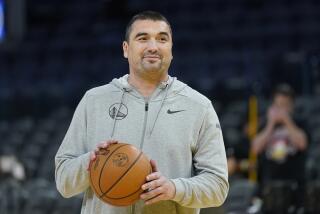Warts and All, a True Serbian Patriot
- Share via
When I met Zoran Djindjic in November 2000, my homework had been hasty. I knew he had been picked by Time magazine as one of a dozen European leaders to watch in the new century. I knew that leaders in Western Europe and Washington saw him as the one politician who might put Serbia on the road to recovery after years of war, dictatorship, corruption, punitive economic sanctions and NATO bombing.
But Djindjic was also known as a Machiavellian intriguer, said to have made secret deals with Slobodan Milosevic. His political party had been accused of involvement in oil smuggling and illegal currency trading. His ego and his thirst for power had led to bitter infighting with his rivals in the opposition, which allowed Milosevic to hold power for much longer than he should have. Of course, in Serbia, one couldn’t expect a knight in shining armor. Getting to the top in a rough neighborhood, Djindjic had obviously traveled the low road part of the way.
Thus, I was caught off guard by the boyish sincerity and pragmatism of the man who faced our camera. His outsized ego was on display, but he was hardly boastful. He downplayed his magnanimity in having stepped aside to let his longtime rival, Vojislav Kostunica, run for president of Serbia. He had even agreed to manage Kostunica’s successful campaign against Milosevic, and then settled for the No. 2 post of prime minister.
Djindjic badly wanted to be president but he ultimately took the longer view, acknowledging that removing Milosevic was a greater good than his own advancement. He was modest and guarded as he described his negotiations with Milosevic’s security forces, which he had apparently convinced not to intervene as tens of thousands of Serbs stormed the parliament, forcing Milosevic to step down. Djindjic had understood the necessity of driving a wedge between Milosevic and his armed forces, and his efforts had been decisive in defeating the dictator.
Of course, it wasn’t completely clean. In Serbia it never is. In later months, it was rumored that Djindjic had made unsavory deals with the generals and police officials -- buying their acquiescence by promising to leave them in power. I’m sure it’s true. Djindjic the pragmatist probably calculated that leaving these criminals in power for the short term was a small price to pay for removing Milosevic, and he assumed he could eliminate them before they’d done too much damage.
I also credit him for having engineered the arrest and extradition of Milosevic to stand trial at The Hague. And as prime minister, he pursued reform and supported the Hague tribunal.
But he was apparently unable to neutralize the powerful “anti-Hague” underworld that flourished under Milosevic, and that is almost certainly responsible for the attack that took his life Wednesday. When I asked Djindjic about the prospects for democracy in Serbia, he replied: “We have so many interest groups from the old regime. [We must] give them the chance to compromise ... but not to just use democracy as a facade to continue with corruption -- and in the end disappoint the people in democracy.”
Djindjic was not a perfect democrat, but he was not a thug either. And despite his decades-long quest for power, he stood aside at the moment it became truly necessary. Now his career has become a symbol for the difficulty of translating the euphoria of a wildly successful nonviolent resistance movement into the hard work of government. The struggle for democracy continues, even where regimes have changed, as in Serbia. Its adversaries are those who think that violence can be used to decide the fate of nations -- and the heads of governments.
Djindjic’s slaying serves as a ghastly warning that unless such reformers receive far more help from the international community, he may not be the last martyr in the cause of democratic nation-building.
More to Read
Sign up for Essential California
The most important California stories and recommendations in your inbox every morning.
You may occasionally receive promotional content from the Los Angeles Times.












